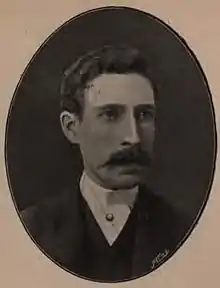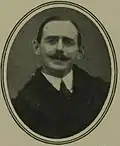Kincardineshire (UK Parliament constituency)
Kincardineshire was a constituency of the House of Commons of the Parliament of Great Britain from 1708 to 1801 and of the Parliament of the United Kingdom from 1801 to 1918. It was represented by one Member of Parliament (MP).
| Kincardineshire | |
|---|---|
| Former County constituency for the House of Commons | |
| Subdivisions of Scotland | Kincardineshire |
| 1708–1918 | |
| Seats | One |
| Created from | Kincardineshire |
| Replaced by | Kincardine & Western Aberdeenshire |
Creation
The British parliamentary constituency was created in 1708 following the Acts of Union, 1707 and replaced the former Parliament of Scotland shire constituency of Kincardineshire. The first election to a Parliament of Great Britain was in 1708. In 1707-08 members of the 1702-1707 Parliament of Scotland were co-opted to serve in the 1st Parliament of Great Britain. See Scottish representatives to the 1st Parliament of Great Britain, for further details.
Boundaries
The constituency represented the county of Kincardineshre., which had previously been represented by two commissioners in the former Parliament of Scotland. The constituency included the whole shire, except for the Royal burgh of Inverbervie which formed part of the Aberdeen Burghs constituency.
History
The constituency elected one Member of Parliament (MP) by the first past the post system until the seat was reorganised in 1918.[1] [2] [3] [4] [5]
In 1918, the constituency was combined with part of Western Aberdeenshire to form the Kincardine and Western Aberdeenshire constituency.
Members of Parliament
- Constituency created (1708)
| Year | Member | Party | |
|---|---|---|---|
| 1708 | Sir David Ramsay, Bt | ||
| 1710 | Sir Alexander Ramsay, Bt | ||
| 1713 | James Scott | ||
| 1734 | John Falconer | ||
| 1741 | Sir James Carnegie, Bt | ||
| 1765 | Sir Alexander Ramsay-Irvine, 6th Bt | ||
| 1768 | Robert Hepburn | ||
| 1774 | Lord Adam Gordon | ||
| 1788 | Robert Barclay Allardice | ||
| 1797 | Sir John Wishart-Belches | ||
| 1806 | William Adam | ||
| 1812 | George Harley Drummond | ||
| 1820 | Sir Alexander Ramsay, Bt | ||
| 1826 | Sir Hugh Arbuthnot | Tory[6] | |
| 1834 | Conservative[6] | ||
| 1865 | James Dyce Nicol | Liberal | |
| 1872 | Sir George Balfour | Liberal | |
| 1892 | John William Crombie | Liberal | |
| 1908 | Arthur Murray | Liberal | |
- Constituency abolished (1918)
Elections
| Decades: |
Elections in the 1830s
| Party | Candidate | Votes | % | ||
|---|---|---|---|---|---|
| Tory | Hugh Arbuthnot | Unopposed | |||
| Registered electors | 82 | ||||
| Tory hold | |||||
| Party | Candidate | Votes | % | ||
|---|---|---|---|---|---|
| Tory | Hugh Arbuthnot | Unopposed | |||
| Registered electors | 82 | ||||
| Tory hold | |||||
| Party | Candidate | Votes | % | ||
|---|---|---|---|---|---|
| Tory | Hugh Arbuthnot | 388 | 59.1 | ||
| Whig | Thomas Burnett | 269 | 40.9 | ||
| Majority | 119 | 18.2 | |||
| Turnout | 657 | 86.1 | |||
| Registered electors | 763 | ||||
| Tory hold | |||||
| Party | Candidate | Votes | % | ||
|---|---|---|---|---|---|
| Conservative | Hugh Arbuthnot | Unopposed | |||
| Registered electors | 844 | ||||
| Conservative hold | |||||
| Party | Candidate | Votes | % | ||
|---|---|---|---|---|---|
| Conservative | Hugh Arbuthnot | Unopposed | |||
| Registered electors | 906 | ||||
| Conservative hold | |||||
Elections in the 1840s
| Party | Candidate | Votes | % | ±% | |
|---|---|---|---|---|---|
| Conservative | Hugh Arbuthnot | Unopposed | |||
| Registered electors | 914 | ||||
| Conservative hold | |||||
| Party | Candidate | Votes | % | ±% | |
|---|---|---|---|---|---|
| Conservative | Hugh Arbuthnot | Unopposed | |||
| Registered electors | 808 | ||||
| Conservative hold | |||||
Elections in the 1850s
| Party | Candidate | Votes | % | ±% | |
|---|---|---|---|---|---|
| Conservative | Hugh Arbuthnot | Unopposed | |||
| Registered electors | 951 | ||||
| Conservative hold | |||||
| Party | Candidate | Votes | % | ±% | |
|---|---|---|---|---|---|
| Conservative | Hugh Arbuthnot | Unopposed | |||
| Registered electors | 997 | ||||
| Conservative hold | |||||
| Party | Candidate | Votes | % | ±% | |
|---|---|---|---|---|---|
| Conservative | Hugh Arbuthnot | Unopposed | |||
| Registered electors | 1,021 | ||||
| Conservative hold | |||||
Elections in the 1860s
| Party | Candidate | Votes | % | ±% | |
|---|---|---|---|---|---|
| Liberal | James Dyce Nicol | 490 | 63.0 | New | |
| Conservative | Thomas Gladstone | 288 | 37.0 | N/A | |
| Majority | 202 | 26.0 | N/A | ||
| Turnout | 778 | 78.8 | N/A | ||
| Registered electors | 987 | ||||
| Liberal gain from Conservative | Swing | N/A | |||
| Party | Candidate | Votes | % | ±% | |
|---|---|---|---|---|---|
| Liberal | James Dyce Nicol | Unopposed | |||
| Registered electors | 1,731 | ||||
| Liberal hold | |||||
Elections in the 1870s
Nicol's death caused a by-election.
| Party | Candidate | Votes | % | ±% | |
|---|---|---|---|---|---|
| Liberal | George Balfour | Unopposed | |||
| Liberal hold | |||||
| Party | Candidate | Votes | % | ±% | |
|---|---|---|---|---|---|
| Liberal | George Balfour | 941 | 63.8 | N/A | |
| Conservative | James Badenach Nicolson[9] | 533 | 36.2 | New | |
| Majority | 408 | 27.6 | N/A | ||
| Turnout | 1,474 | 83.4 | N/A | ||
| Registered electors | 1,767 | ||||
| Liberal hold | Swing | N/A | |||
Elections in the 1880s
| Party | Candidate | Votes | % | ±% | |
|---|---|---|---|---|---|
| Liberal | George Balfour | 1,037 | 67.5 | +3.7 | |
| Conservative | David Sinclair[10] | 500 | 32.5 | −3.7 | |
| Majority | 537 | 35.0 | +7.4 | ||
| Turnout | 1,537 | 83.6 | +0.2 | ||
| Registered electors | 1,838 | ||||
| Liberal hold | Swing | +3.7 | |||
| Party | Candidate | Votes | % | ±% | |
|---|---|---|---|---|---|
| Liberal | George Balfour | 3,160 | 71.4 | +3.9 | |
| Conservative | David Scott Porteous | 1,267 | 28.6 | −3.9 | |
| Majority | 1,893 | 42.8 | +7.8 | ||
| Turnout | 4,427 | 79.3 | −4.3 | ||
| Registered electors | 5,580 | ||||
| Liberal hold | Swing | +3.9 | |||
| Party | Candidate | Votes | % | ±% | |
|---|---|---|---|---|---|
| Liberal | George Balfour | Unopposed | |||
| Liberal hold | |||||
Elections in the 1890s

| Party | Candidate | Votes | % | ±% | |
|---|---|---|---|---|---|
| Liberal | John William Crombie | 2,444 | 64.0 | N/A | |
| Kincardineshire Church Defence | Johnston Stephen[n 1] | 1,376 | 36.0 | New | |
| Majority | 1,068 | 28.0 | N/A | ||
| Turnout | 3,820 | 66.8 | N/A | ||
| Registered electors | 5,719 | ||||
| Liberal hold | Swing | N/A | |||
| Party | Candidate | Votes | % | ±% | |
|---|---|---|---|---|---|
| Liberal | John William Crombie | 2,603 | 56.1 | -7.9 | |
| Conservative | Charles Hepburn-Stuart-Forbes-Trefusis | 2,040 | 43.9 | New | |
| Majority | 563 | 12.2 | -15.8 | ||
| Turnout | 4,643 | 78.7 | +11.9 | ||
| Registered electors | 5,897 | ||||
| Liberal hold | |||||
Elections in the 1900s
| Party | Candidate | Votes | % | ±% | |
|---|---|---|---|---|---|
| Liberal | John William Crombie | 3,092 | 66.8 | +10.7 | |
| Conservative | James Mowat | 1,536 | 33.2 | −10.7 | |
| Majority | 1,556 | 33.6 | +21.4 | ||
| Turnout | 4,628 | 72.2 | −6.5 | ||
| Registered electors | 6,410 | ||||
| Liberal hold | Swing | +10.7 | |||
| Party | Candidate | Votes | % | ±% | |
|---|---|---|---|---|---|
| Liberal | John William Crombie | 3,877 | 71.8 | +5.0 | |
| Conservative | Sydney Gammell | 1,524 | 28.2 | −5.0 | |
| Majority | 2,353 | 43.6 | +10.0 | ||
| Turnout | 5,401 | 76.4 | +4.2 | ||
| Registered electors | 7,067 | ||||
| Liberal hold | Swing | +5.0 | |||

| Party | Candidate | Votes | % | ±% | |
|---|---|---|---|---|---|
| Liberal | Arthur Murray | 3,661 | 65.1 | −6.7 | |
| Conservative | Sydney Gammell | 1,963 | 34.9 | +6.7 | |
| Majority | 1,698 | 30.2 | −13.4 | ||
| Turnout | 5,624 | 79.0 | +2.6 | ||
| Registered electors | 7,119 | ||||
| Liberal hold | Swing | −6.7 | |||
Elections in the 1910s
| Party | Candidate | Votes | % | ±% | |
|---|---|---|---|---|---|
| Liberal | Arthur Murray | 3,926 | 67.5 | +2.4 | |
| Conservative | Robert Pearson | 1,891 | 32.5 | -2.4 | |
| Majority | 2,035 | 35.0 | +4.8 | ||
| Turnout | 5,817 | 81.0 | +2.0 | ||
| Liberal hold | Swing | +2.4 | |||
| Party | Candidate | Votes | % | ±% | |
|---|---|---|---|---|---|
| Liberal | Arthur Murray | Unopposed | |||
| Liberal hold | |||||
General Election 1914–15:
Another General Election was required to take place before the end of 1915. The political parties had been making preparations for an election to take place and by July 1914, the following candidates had been selected;
- Liberal: Arthur Murray
- Unionist: Sidney Herbert
Notes and References
Notes
- Some sources describe Stephen as a Liberal Unionist
References
- "Kincardineshire". History of Parliament Online (1690-1715). Retrieved 9 June 2019.
- "Kincardineshire". History of Parliament Online (1715-1754). Retrieved 9 June 2019.
- "Kincardineshire". History of Parliament Online (1754-1790). Retrieved 9 June 2019.
- "Kincardineshire". History of Parliament Online (1790-1820). Retrieved 9 June 2019.
- "Kincardineshire". History of Parliament Online (1820-1832). Retrieved 9 June 2019.
- Stooks Smith, Henry (1842). The Register of Parliamentary Contested Elections: Containing the Uncontested Elections Since 1830. London: Simpkin, Marshall, & Co. p. 205. Retrieved 8 May 2020 – via Google Books.
- Fisher, David R. "Kincardineshire". The History of Parliament. Retrieved 8 May 2020.
- Craig, F. W. S., ed. (1977). British Parliamentary Election Results 1832-1885 (e-book) (1st ed.). London: Macmillan Press. ISBN 978-1-349-02349-3.
- "Election for the County of Kincardine". Aberdeen Press and Journal. 4 February 1874. p. 1. Retrieved 2 January 2018.
- "Representation of Kincardine-shire". Aberdeen Free Press. 27 March 1880. p. 5. Retrieved 3 December 2017 – via British Newspaper Archive.
- Debrett's House of Commons and Judicial Bench, 1889
- Craig, FWS, ed. (1974). British Parliamentary Election Results: 1885-1918. London: Macmillan Press. ISBN 9781349022984.
- Whitaker's Almanack 1893
- Debrett's House of Commons and the Judicial Bench, 1901
- Whitaker's Almanack 1907
- The Times House of Commons 1910; Politico's Publishing 2004 p100
- Debrett's House of Commons and the Judicial Bench, 1916
- The Times House of Commons, 1911; Politico's Publishing 2004, p110